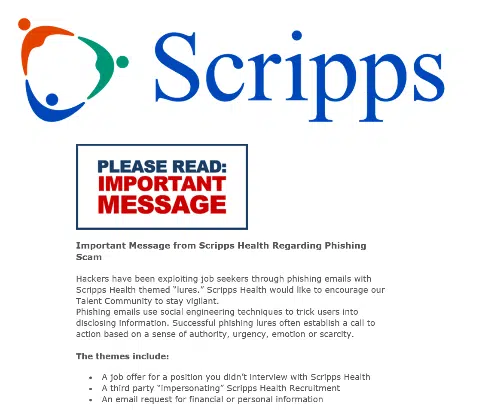Online Job Scams See Rise Amid Pandemic
Home Help Center Online Job Scams See Rise Amid Pandemic

With some businesses opening back up after temporarily closing due to the COVID-19 pandemic, scammers are trying to capitalize using online job scams to steal people’s personal information.
Recently, Scripps Health found hackers exploiting job seekers through phishing emails with Scripps Health-themed “lures.” Scripps sent the following email to warn their community members:

ATA Engineering, another San Diego-based company, reports they also are seeing similar-type online job scams.
The Identity Theft Resource Center (ITRC) has seen a rise in victims contacting the organization about online job scams, including phishing emails. Some of the particular job scams reported to the ITRC include ones from Indeed, Zip Recruiter, and Facebook. The ITRC has had more than 40 victims reach out about online job scams the last three months.
Who Is It Targeting
People looking for work amidst the COVID-19 pandemic
What Is It
Either a fake listing posted on a job board or a phishing email, robocall, social media message, or text message looking for a response.
What Are They After
While scammers attack in different ways, they are all looking for one thing: personal information. They hope they can trick people who are desperate or vulnerable into giving up sensitive data like usernames and passwords, financial data, or Social Security numbers. Once scammers have that information, they can commit many different forms of identity theft.
How You Can Avoid It
- Never click on a link or open an attachment from an email you are not expecting. Instead, go directly to the source to verify the validity of the message.
- Review all emails and websites carefully to make sure there are no suspicious addresses, subject lines or URLs.
- Be careful about how much personal data you share, at least during the application process. Do not turn over information like your Social Security number until you are hired.
- Make sure you have the job, and it is legitimate, before giving away financial information like a bank account number or routing number for direct depositing of paychecks.
If you think you may have fallen victim to an online job scam, you can call the ITRC toll-free at 888.400.5530. You can also live-chat with an expert advisor on the company website.
Read more of our latest articles below
How much information are you putting out there? It’s probably too much. To help you stop sharing Too Much Information, sign up for the In the Loop.
Get ID Theft News
Stay informed with alerts, newsletters, and notifications from the Identity Theft Resource Center

